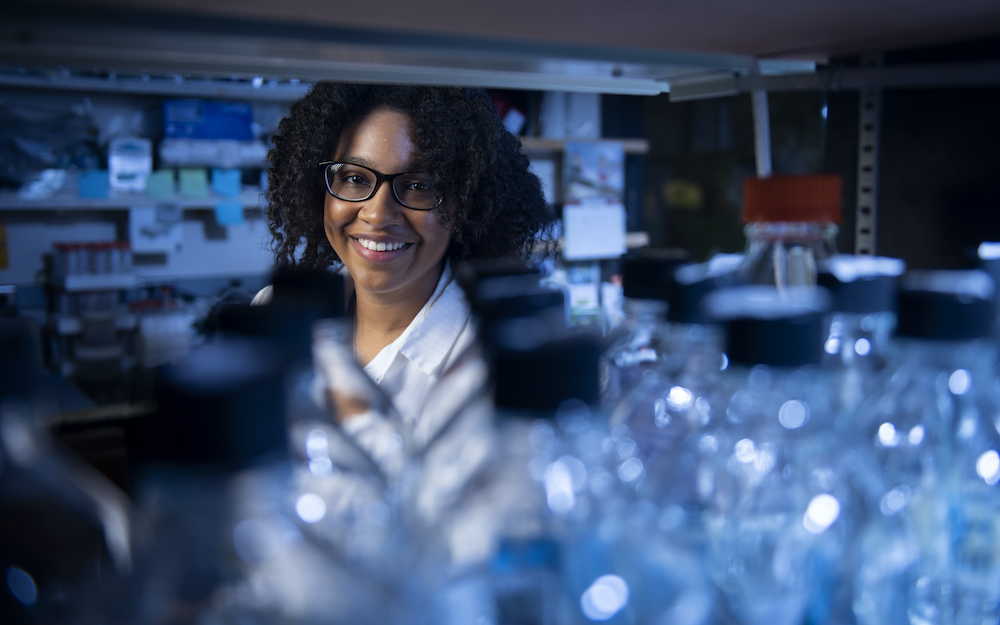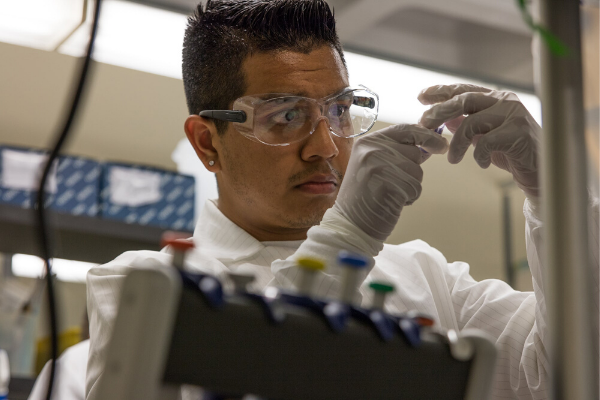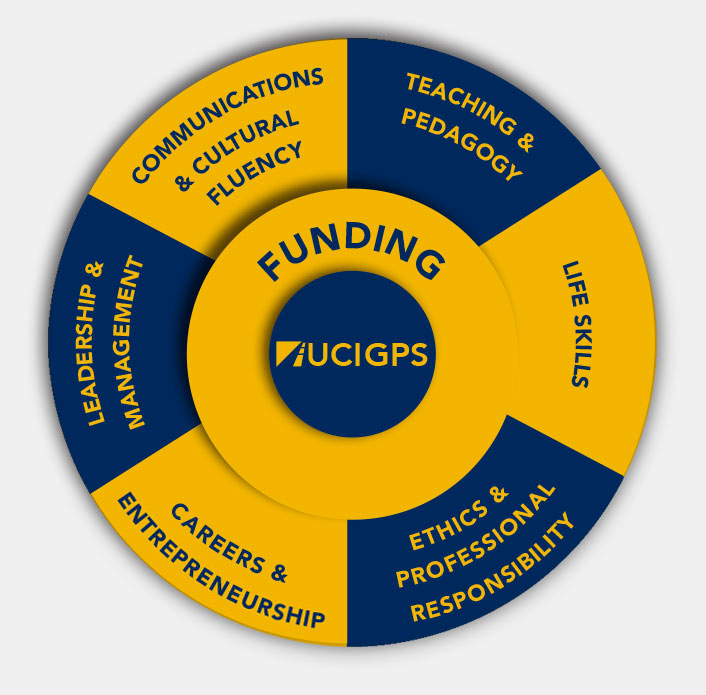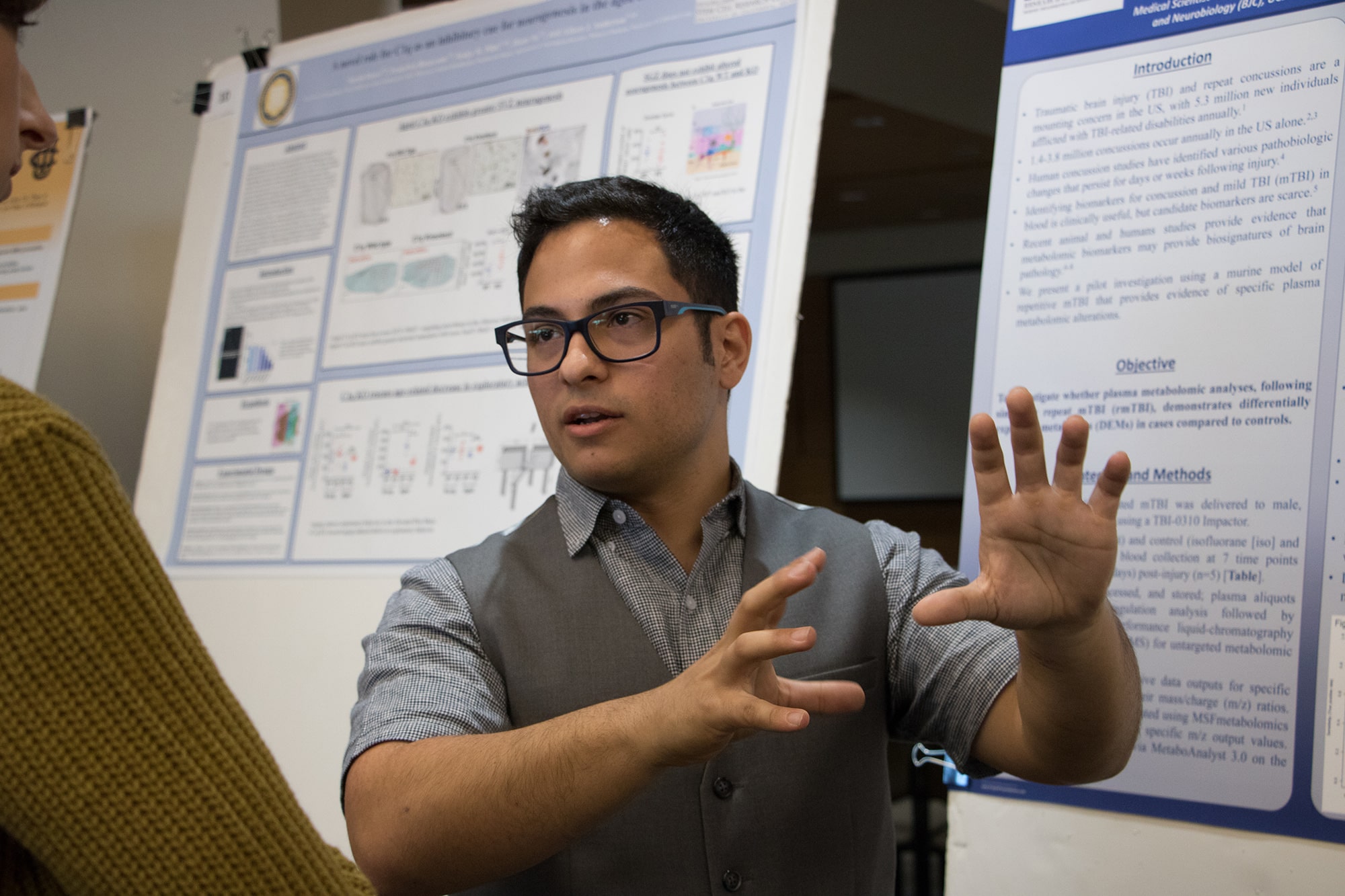Graduate Student Resources
Training Opportunities


GPS-STEM
GPS-STEM is run in coordination with four STEM Schools (Biological Sciences, Physical Sciences, Engineering, and Medicine) and offers workshops and hands-on experiences to develop professional soft skills that are valued by academia, government, and industry sectors. > Learn More about GPS-STEM

Research Development and Administration
The Research Development office offers graduate students and postdoctoral scholars one-on-one help to develop and submit fellowship proposals. These prestigious awards give trainees the ability to tailor their research training to career goals, attend conferences and network, and attend workshops and programming geared toward professional development. Examples include the NIH F31, F32, F99, and K99 and NSF Doctoral Dissertation Improvement grants and Postdoctoral Research Fellowships in Biology. Please email the Research Development Team at bio-research@uci.edu for assistance with proposal development and submission

Graduate Professional Success Program (GPS)
Located in UCI Graduate Division, GPS serves as an umbrella for individual or thematic workshops, certificate programs, and academic courses designed to educate students about and prepare them for new and exciting career opportunities within academia and beyond. > Learn More

Office of Postdoctoral Affairs
Graduate and Postdoctoral Research Training Grants
Research training grants provide funding to support current graduate students and current or prospective postdoctoral scholars by paying for tuition, stipends, and fees. These grants primarily support trainees to perform research and also offer opportunities for academic enrichment. Faculty members select trainees to be part of the training program. If you are interested in learning more about a training program, click the project title to view an abstract or consult the training grant website.
| PI(s) | Project Title (click for abstract) | Funder/Mechanism | Trainee Type | Grant Period | Summary | Website |
|---|---|---|---|---|---|---|
| Bert Semler (SOM) | Virus-Host Interactions: A Multi-Scale Training Program | NIH T32 | Graduate | 9/1988 to 8/2025 | The goal of this program is to train graduate students in the fundamental aspects of molecular virology as they relate to the regulation of gene expression, virus structure, virus-host interactions and pathogenesis. The program also emphasizes interdisciplinary training in viral proteomics as it relates to structures of viral proteins as well as intact virus particles. | https://cvr.bio.uci.edu/vtg/ |
| Carl Cotman (NBB), Andrea Tenner (MBB) | Training in the Neurobiology of Aging | NIH T32 | Graduate, Postdoc | 9/1982 to 4/2024 | This training program emphasizes preparation and instruction in the application of molecular and quantitative approaches to the elucidation of the cellular and molecular mechanisms of age-related neurodegeneration, brain plasticity during aging, and age-related changes in learning and memory. | https://mind.uci.edu/research-education-component/#announcements |
| Christopher Hughes (MBB) | Training Program in Cardiovascular Applied Research and Entrepreneurship | NIH T32 | Graduate | 6/2013 to 5/2023 | The CARE training program trains graduate students at the intersection of engineering, cardiovascular science, and entrepreneurship. The expectation is that these trainees will produce quality and impactful research in cardiovascular science and technology and develop enhanced skills to assess the translational potential of cardiovascular research. | https://circ.eng.uci.edu/research/graduate-care-program/ |
| David Fruman (MBB), Aimee Edinger (DCB) | A Training Program for Interdisciplinary Cancer Research | NIH T32 | Graduate, Postdoc | 7/1980 to 6/2026 | The Training Program for Interdisciplinary Cancer Research (IDCR) provides UCI graduate students and postdoctoral fellows with comprehensive, highly interdisciplinary training that includes cancer biology, the most current research methods, and a focus on translational science such as the development of novel cancer therapeutics and diagnostics. This foundation, together with professional development activities, produces well-trained experts armed to successfully attack the cancer problem from vantage points in both academia and industry. | https://cancerresearch.uci.edu/training/ |
| Eric Pearlman | Immunology Research Training Grant | NIH T32 | Graduate | 7/2004 to 7/2021 | The objective of the Immunology Research Training Program is to train graduate students to study the role of immune system in infection, autoimmunity, neuro-inflammation and cancer. | https://immunology.uci.edu/education/t32-immunology-training-grant/ |
| Leslie Thompson (NBB), Peter Donovan (DCB) | Training Program in Stem Cell Translational Medicine for Neurological Disorders | NIH T32 | Graduate | 7/2013 to 6/2023 | The goal of the Training Program in Stem Cell Translational Medicine for Neurological Disorders is to provide opportunities for graduate student trainees to perform translational “bench” research that could treat human neurological disease and injury. | https://www.bio.uci.edu/t32-training-program-in-stem-cell-translational-medicine-for-neurological-disorders/ |
| Luis Mota-Bravo (MSP) | UCI International Research Training | NIH T37 | Undergraduate, Graduate | 9/1993 to 11/2022 | The MHIRT Program offers international research training opportunities to qualified undergraduate, graduate students who are from groups underrepresented in basic science, biomedical, clinical or behavioral health research career fields. MHIRT provides international research training for the purpose of: Encouraging undergraduate and graduate students from underrepresented populations to pursue careers in biomedical and/or behavioral health research fields. | https://undergraduate.bio.uci.edu/minority-science-program/ |
| Marcelo Wood (NBB) | Training Program in Substance Use Disorders | NIH T32 | Graduate | 7/2020 to 6/2025 | The goal of the Training Program in Substance Use and Use Disorders is to train the next generation of innovative researchers in the field of addiction neuroscience by leveraging the exceptional strength in neuroscience at UCI, and the new centers focused on addiction research, to provide an educational and research experience that will position trainees as new leaders in the field. | https://www.bio.uci.edu/t32-training-program-in-substance-use-and-use-disorders/ |
| Melissa Lodoen (MBB), Celia Goulding (MBB), Jennifer Martiny (EEB) | T32 For Training in Microbiology and Infectious Diseases | NIH T32 | Graduate | 8/2019 to 7/2024 | The primary objective of this Training Program is to provide doctoral students with integrated training in three focus areas: 1) microbial structure and metabolism, 2) microbe- host interactions, and 3) microbial communities. | https://www.bio.uci.edu/research/t32-interdisciplinary-training-microbiology-infectious-diseases/ |
| Michael Yassa (NBB), Bruce McNaughton (NBB) | Training Program in Learning and Memory | NIH T32 | Graduate | 7/2019 to 6/2024 | The program’s goal is to train the next generation of innovative leaders in neuroscience by empowering them with the skills, knowledge, and team science core values necessary to comprehensively understand the neural basis of learning and memory. | https://cnlm.uci.edu/t32/ |
| Raju Metherate (NBB) | Interdisciplinary Training Program in Hearing Research | NIH T32 | Graduate, Postdoc | 7/2010 to 6/2025 | This training program supports graduate students and postdoctoral fellows training in interdisciplinary hearing research. Mandatory features of the training program that encourage interdisciplinary interactions are participation in all CHR activities (e.g., seminar series, journal club, and two annual conferences) required oral and poster presentations to scientifically diverse audiences on three occasions per year, and regular meetings with basic and clinical scientists. | https://www.bio.uci.edu/research/t32-interdisciplinary-training-program-in-hearing-research/ |
| Steven Allison (EEB) | NRT: A Training Incubator for Addressing Urban Environmental Change from Ridge to Reef (R2R) | NSF NRT | Graduate | 9/2017 to 8/2022 | R2R trains graduate students in the process of convergent science whereby engineers, scientists, and practitioners co-develop research priorities to solve common problems. The R2R curriculum will focus on interdisciplinary knowledge, professional development, and communication skills. | https://r2r.bio.uci.edu/about/ |
| Tallie Z. Baram (SOM) | Epilepsy Research Training Program | NIH T32 | Graduate, Postdoc | 7/2003 to 6/2024 | This training program aims to: (1) Provide Trainees with a broad basic, translational and clinical understanding of Epilepsy and the approaches for its study. (2) Provide Trainees with the tools to perform top-quality science via workshops and discussions that address quantitative aspects of research, including study design, statistics, and reproducibility. (3) Provide Trainees with state-of-the-art scientific training via assignment to diverse modern laboratories and rigorous implementation of oversight by individualized committees. (4) Provide Trainees with the knowledge of the diverse facets of Science-related career choices and prepare them for these paths via career development activities. (5) Facilitate well-being and integration of Trainees from diverse backgrounds by creating a Training Community where trainees at pre-and postdoctoral level intersect, exchange role models and advice, and support one another. | https://epilepsyresearch.uci.edu/education-and-training/ |
| Thomas Lane (NBB), Kim Green (NBB) | Neuroimmunology Training Program at the University of California, Irvine | NIH T32 | Graduate | 7/2022 to 6/2027 | The Neuroimmunology Training Program (NITP) formally brings together faculty members from across the neuroimmunology research spectrum to participate in mentorship and program-wide activities to share expertise and further develop the neuroimmunology field. The NITP provides an outstanding opportunity for trainees to develop intellectually, advance and optimize their thesis research projects, create a valuable network of colleagues, and prepare for a highly successful research career focused on the crossroads of immunology and neuroscience | https://www.bio.uci.edu/t32-training-program-in-neuroimmunology/ |
| Bogi Andersen (SOM), Anand Ganesan (SOM) | Interdisciplinary Training Program in Skin Biology | NIH T32 | Graduate, Postdoc | 5/2022 to 4/2027 | The goal of this program is to develop skin biologists that will be highly skilled in integrating bioengineering, including imaging, and computation into their research to make discoveries in skin biology. | https://skincenter.uci.edu/index.php |
| Joshua Grill (NBB), Elizabeth Head (SOM) | Training in Translational ADRD Neuroscience (TITAN) | NIH T32 | Graduate, Postdoc | 9/2021 to 8/2026 | This training program aims to generate the next cutting-edge, innovative and collaborative generation of ADRD researchers. The underlying educational principle is to provide foundational training (e.g., professional skills, learning to mentor, basics of ADRD) and build on this with mentoring in a team science collaborative environment that will facilitate bench to clinic research. | https://mind.uci.edu/research-education-component/#announcements |
| Arthur Lander (DCB), Qing Nie (SOM) | Mathematical, Computational, and Systems Biology | NIH T32 | Graduate | 7/2020 to 6/2025 | The goal of this program is to provide students from a variety of educational backgrounds with Ph.D. training suitable for research careers in the nascent field of Systems Biology. The program emphasizes in-depth classroom study, interdisciplinary research rotations, and individualized advising. | https://ccbs.uci.edu/education/mcsb/ |
| Krzysztof Palczewski (SOM) | Visual Sciences Training Program (VSTP) | NIH T32 | Graduate | 5/2022 to 4/2027 | This training program is organized according to four major vision science research themes: (a) Retinal Development and Function; (b) Retinal Disorders: Diabetic Retinopathy (DR) and Age-related Macular Degeneration (AMD); (c) Biochemistry, Cell Biology, Immunology of Eye Diseases; and (d) Genetics, Physiology, and Epidemiology of Eye Diseases. These themes, involving groups of collaborating faculty, students and postdoctoral fellows, provide a natural way to organize the training program. In addition, there is a strong translational theme focused on therapeutic discovery that is an important aspect of all four research clusters. | https://ctvr.uci.edu/ |
| Vincent Caiozzo, Elizabeth Head | ICTS TL-1 Scholars Training Program | NIH TL1 | Postdoc | 8/2015 to 6/2024 | The UCI Institute for Clinical and Translational Science (ICTS) has a NIH-funded (TL-1) training program designed to integrate training in clinical research and translational science into the core curriculum of students in medicine, biology, public health, nursing, pharmaceutical sciences, biomedical and social sciences, physical sciences, engineering, and informatics. | https://www.icts.uci.edu/education/tl1-info.php#TL-1%20Program |
